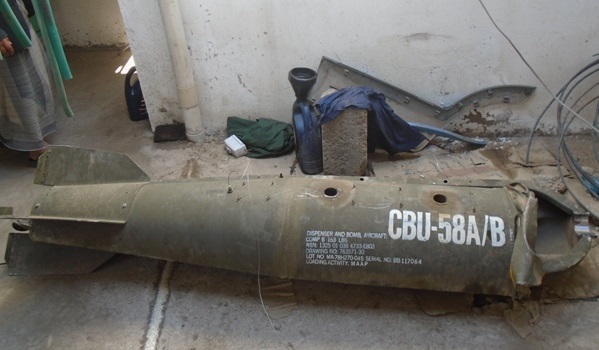One of the world´s largest arms manufactures, the US company Textron, will no longer produce cluster munitions. This news comes just days before the annual meeting of countries which are part of the convention banning cluster munitions.
PAX, which co-founded the Cluster Munition Coalition and was involved with getting cluster munitions banned in 2008, is pleased with the news. For the past few years, PAX has pursued the Stop Explosive Investments campaign, urging investors, banks and other financial institutions to remove their financial support from Textron, among other manufactures of cluster munitions.
The annual PAX publication “Worldwide Investments in Cluster Munitions; a shared responsibility” has for years identified Textron as a cluster munition producer. Textron manufactures the Sensor Fuzed Weapon (SFW), a type of cluster munition that is banned under the 2008 Convention on Cluster Munitions (CCM). PAX programme leader Suzanne Oosterwijk says, “That the company is now going to stop making these weapons, the victims of which are disproportionately civilians, is wonderful news.”
The 2016 update of the report revealed that between June 2012 and April 2016 worldwide, 49 financial institutions had investments in Textron, with a total of nearly 12,5 billion dollars invested. Research by Human Rights Watch and Amnesty International has shown that Textron’s Sensor Fuzed Weapons have been used in Yemen by the Saudi-led coalition. In May of this year, the United States government blocked the transfer of Textron’s Sensor Fuzed Weapons to Saudi Arabia because of concern for their use in or near civilian areas. Now, Textron has decided to put an end to the production of this weapon altogether. The company cites a decline in orders and “the current political climate” as motivation, an indication that the CCM is the global norm and that the stigma associated with cluster bombs continues to grow.
Pressure from the financial sector also appears to have influenced Textron´s decision. As financial analyst Carter Copeland explains on Barron´s Stock Watch website, “[…] interpretations of where Textron stood vis-a-vis international weapons treaties” meant many (European) investors had excluded the company from their investment portfolios. Such exclusions send a clear message that companies are not acceptable business partners as long as they are involved in the production of cluster munitions.
Since the start of the Stop Explosive Investments campaign in 2009, dozens of financial institutions have put in place policies proscribing investment in cluster munition producers, and 10 states have enacted legislation prohibiting such investments.
Cluster munitions are banned by 119 states for the harm they cause civilians, both during and after a conflict. The US has yet to join the convention. But now more than ever, with the withdrawal of the last US manufacturer of cluster munitions, nothing stands in the way of its rapid accession to the treaty.
During the Sixth Meeting of States Parties to the CCM in Geneva from the 5th to the 7th of September, PAX will urge more countries to ban investments in producers of cluster munitions.




